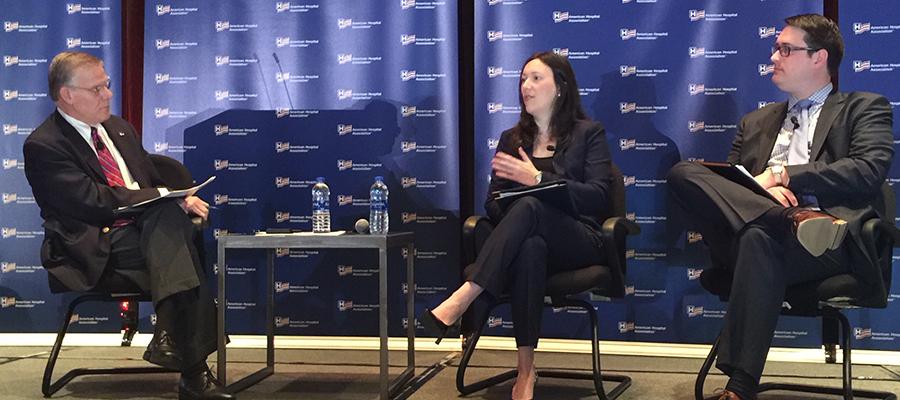AHA Outlines 2019 Rural Advocacy Agenda; Full Coverage from Rural Health Care Leadership Conference

Read additional coverage from day one and day three of the conference.
AHA President and CEO Rick Pollack (left) kicked off today's programming at the AHA Rural Health Care Leadership Conference and moderated a discussion with Erika Rogan, AHA senior associate director of policy, and Travis Robey, AHA senior associate director of federal relations, about what's happening on Capitol Hill and the association's rural advocacy agenda for 2019.
Rick Pollack discussing some of these advocacy priorities, the pivotal role trustees can play in these efforts and the importance of this week's conference.
In addition, they discussed AHA's Rural Advocacy Agenda, which contains recommendations for ensuring federal policies make it easier for rural hospitals to keep providing local access to high-quality, affordable health care. Topics include ensuring fair and adequate reimbursement for care; improving access to care and supporting new models of care that work for rural America; removing red tape that hinders care; updating federal telehealth coverage policies, expanding access to broadband connectivity, and providing more incentives for providers to adopt and use health information technology; bolstering the rural health care workforce; and reining in the skyrocketing costs of prescription drugs.
"The AHA is going to keep advocating for the health of rural America's patients and hospitals and health systems," Pollack said. Trends and their Impact on Governance
During this keynote session, James Orlikoff, president of Orlikoff & Associates Inc., discussed how societal, economic and demographic challenges, in addition to the daunting and disruptive pressures of the health care environment, are stressing the traditional governance model. He described the trends challenging the traditional governance model, and shared strategies to sustain it as long as possible and to create new governance models.
Strategy Sessions
Conference attendees participated in strategy sessions on communication and leadership to foster a culture of teamwork; harnessing the power of data to transform care; merging a rural not-for-profit health system with a rural for-profit physician group; addressing social determinants of health while improving outcomes and impacting the cost of care; stopping violence in health care; fostering the board and CEO relationship; and navigating health efficiency through collaboration.
Watch AHA Today for more coverage from the conference and follow the action on social media using #RuralHealth.
